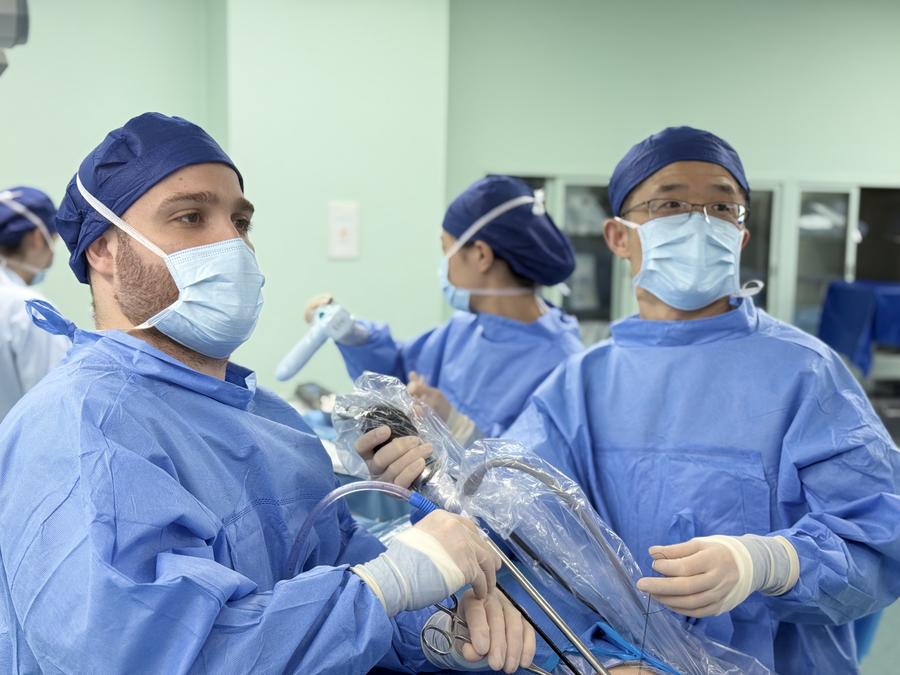
政府新闻
上海的“梦想奖学金”改变了这位法国外科医生的职业生涯 2025-08-21
 Romain Verge performs uniportal video-assisted thoracic surgery under the guidance of an instructor at Shanghai Pulmonary Hospital, in Shanghai, east China, on July 22, 2025.
Romain Verge performs uniportal video-assisted thoracic surgery under the guidance of an instructor at Shanghai Pulmonary Hospital, in Shanghai, east China, on July 22, 2025.Romain Verge, a 33-year-old thoracic surgeon from France, recently completed a six-month training program at Shanghai Pulmonary Hospital, which, he said, had been "a dream."
At the hospital, the French surgeon performed his first uniportal video-assisted thoracic surgery (VATS) -- a minimally invasive technique that significantly reduces pain and recovery time for patients.
Until last week, the surgeon had spent six months immersing himself in one of the world's most advanced surgical environments, mastering procedures he once thought impossible.
Verge works at Toulouse University Hospital, which ranks among France's top hospitals, and arrived at Shanghai Pulmonary Hospital with the clear goal of learning to perform uniportal VATS.
"In France, most minimally invasive surgeries are performed via multiportal VATS with three incisions. But I was drawn to the uniportal approach by its single incision, less pain, and faster recovery," Verge told Xinhua. "Shanghai Pulmonary Hospital's global reputation made it the perfect fit."
As China's leading thoracic surgery institution, Shanghai Pulmonary Hospital pioneered uniportal VATS in 2012 and has been promoting the innovative technique ever since.
Today, the hospital performs over 27,000 thoracic surgeries annually, with minimally invasive techniques accounting for over 97 percent of those surgeries. Several innovative surgical approaches developed at the hospital have been incorporated into international medical guidelines.
Building on this expertise, the hospital established an international thoracic surgery training center in 2014. More than 1,000 surgeons from over 100 countries and regions have trained there, benefiting from live surgical observation, simulated operations, animal wet labs and cutting-edge symposiums.
In February 2025, Verge joined the program as a six-month fellow. "Coming here was a dream. I wanted to improve patient care not just with medication, but also with my hands," he said. He believes surgeons can be artists, in a way, by making patients feel better and by fighting cancer.
The center's "theory-simulation-practice-follow-up" training system ensured that Verge was never a passive observer. From day one, he was never just observing -- he was a part of the surgical team, receiving real-time feedback in areas such as surgery planning and instrument handling.
Recalling the first uniportal VATS he performed during his training, Verge admitted he was nervous. "What really stood out was how kind and supportive every surgeon was, generously sharing tips and advice to help refine my skills. Even the nursing and anesthesiology teams were incredibly helpful. The seamless teamwork and sense of belonging made the integration process truly rewarding," he said.
The workload was heavy. The hospital performs 500 to 600 thoracic surgeries each week, including many rare and complex cases. Step by step, the young surgeon advanced from observing operations to performing them himself. By the end of his fellowship in August, he had carried out approximately 60 uniportal surgeries.
"That was something I wouldn't have thought possible just six months ago. It was truly a dream," he said.
Beyond gaining technical skills, the experience has marked a turning point in his career, reshaping his views on work ethics, patient care, medical education and teamwork, he noted.
In his view, the technological advancements at the hospital are equally impressive, with the surgical robots developed in China being among the world's most sophisticated.
"The mindset is all about working harder, operating more, and continuing to love what you do every day. That spirit is incredibly motivating," he said.
Now back in France, Verge plans to start performing uniportal VATS at Toulouse University Hospital. "It requires higher skills from the surgeon. It is better for the patients. It is the future of thoracic surgery, which has already been fulfilled in China. So it's important to spread it in Europe," he said.
Moreover, he aims to foster institutional ties by inviting Chinese surgeons to France, proposing collaborative arrangements like joint research, joint fellowships, and sharing the French national thoracic database, Epithor, to improve Chinese studies. He believes that international exchange can improve patient care and innovation on both sides.
Wang Haifeng, deputy director of Shanghai Pulmonary Hospital's thoracic surgery department, told Xinhua that as a global leader in uniportal VATS, the hospital is committed to advancing global thoracic surgery training.
"Our center's influence reflects China's role in shaping surgical innovation. Looking ahead, we will refine curricula, expand our faculty, and enhance training for international participants," Wang said.
Source: Xinhua

